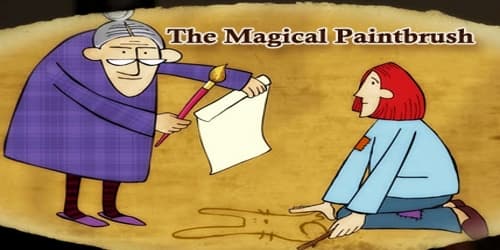Once upon a time, a poor peasant boy named Wang toiled in the snowy fields outside a school. As he was working, he peered through the window, and inside he saw a master teaching his pupils to paint. The moment Wang saw the beautiful pictures; he longed to learn to paint.
At day’s end, after all the pupils had gone home, Wang walked inside and approached the painting master. “Sir,” he said shyly, “will you lend me a paintbrush so that I can take pictures, too?”
“Beggar!” the master shouted. “Get out of this place! Boys like you cannot paint!”
Wang was sad, but only for a moment. He was a strong-willed, pure-hearted boy, and he knew he would somehow learn to paint. The next morning he gathered sticks in the forest, and these he whittled to a fine point. With his sticks, he drew pictures in the mud and snow. He was soon using reeds he cut at the river’s edge, and there he drew pictures on the riverbank. And sometimes, when he drew water from the well, he would dip his finger in the water and draw pictures on the stones.
Everyone admired his pictures. They were so beautiful, they seemed almost alive.
Still, Wang longed to have a real paintbrush. One night as he slept, he dreamed that an old man came to his bedside and placed a paintbrush in his hands. “This is a magical brush,” the old man whispered. “Use it with care.”
When the boy awoke, he was amazed to see a paintbrush in his hand. For the next few weeks, he ate very little. Instead, he saved his meager wages to buy paper and ink and paints, and once he had his tools, he began to paint with his magical paintbrush.
Sure enough, his touch and his magical brush brought everything he painted to the life. The birds he drew flew into the air. The butterflies he drew fluttered out the window. The flowers perfumed the room. The fruit rolled off the page.
As word spread of Wang’s magical powers, people came to him, asking him to paint what they needed. He painted hoes and plows and lamps and water buckets for the poorest peasants, but he never was greedy. He painted only those things other people needed, only that which would make the world a better place.
Before long no one could speak of anything but Wang and his magical brush.
When the emperor, an evil man, heard about the boy, he sent for him. The emperor’s servants brought him before their master.
“From now on you will live in my palace and paint only for me,” the emperor said.
Wang shook his head. “I must paint only for those in need,” he said. “You have all that you need.”
The emperor was furious and commanded his servants to tie up the boy in the cellar. “Stay there and think about my command,” he roared.
He left the boy there for many days, certain that in the cold, and without food, Wang would change his mind. But when he sent his servants to fetch the boy, he found him sitting comfortably in a big chair, eating a large bowl of rice. Beside him, a woodstove burned.
The emperor realized that Wang could paint whatever he needed, so he ordered his servants to take away the brush, and his food and stove as well.
This the servants did, and now the emperor began to paint a picture himself. He wanted to be the wealthiest man in the world, and so he began to paint an enormous gold brick. He painted it bigger and bigger and bigger. “There!” he cried when he was finished, “and now my gold will become real!”
The painting did come to life, but instead of becoming a real gold brick, it turned into a slithering yellow serpent that wrapped itself around the emperor, crushing him before his servant’s eyes.
The servants rushed to release Wang from the cellar. “Help us!” they cried. “The serpent will kill all of us!” They gave him back his paintbrush.
Wang stepped into the hall, paintbrush in hand, and the serpent at once coiled itself into a ball and died.
It was then that all the people understood that the brush itself was not magical. It was Wang who possessed the magic.
“I have only the magic of a good heart,” he said. Returning to his village, he painted only that which people needed. As his fame grew, he began to travel around the country, providing for the poor wherever he went, spreading beauty and joy, goodness and comfort to all of those in need.
















